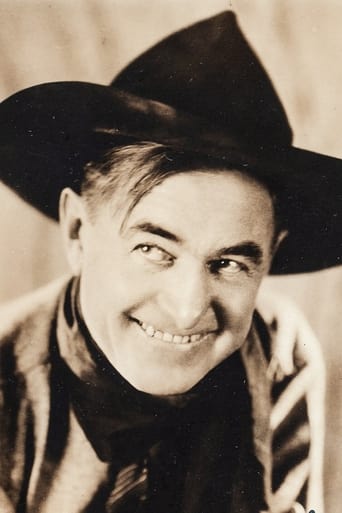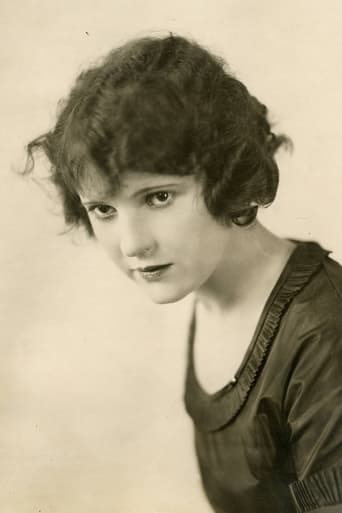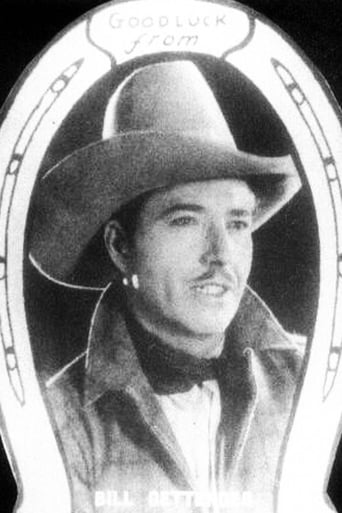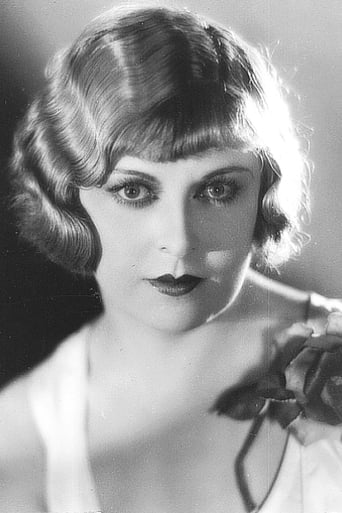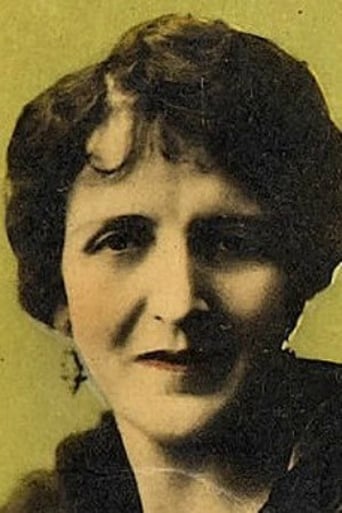Edgar Allan Pooh
. . . that he's too eager to settle for "sloppy seconds" as BUCKING BR0ADWAY draws to its soggy close. Harry Carey as Sheltered Buckaroo "Cheyenne Harry" seems to blow his chance at Happiness with his One True Friend, a nameless New York City pick-pocket\hooker. Maybe his fickle one-time fiancée Helen Clayton is the only fish in Harry's native Wyoming sea, but after a week sleeping on an East-bound slow train with a brutish drunken womanizer named Eugene, Helen's clearly Damaged Goods. Back in the early 1900s Harry would have lacked a solid Public School grounding in Sex Education, so he's in no position to judge the difference between a dog-eared "country gal" (with an emphasis on that first syllable) and a state-of-the-art Pro in Good Working Order. While there's about an 80% chance that Helen's harboring Gene's Fetal Alcohol Syndrome bun in her oven, Harry's Soft-Hearted but helpful strumpet no doubt has used all the tricks at her disposal to stave off pregnancy during the five decades before she'll have The Pill at her disposal. One can only hope that there's a post-Big Brawl "Rest of the Story" here, in which Harry wises up, swears off Wyoming, and makes the chick who's been Around the World his First Lady.
Andrew Boone
John Ford is a director I shrugged off for a long time. At the risk of coming off as an elitist, I have to say that I could simply never find much reason as a cinema enthusiast to be invigorated by Hollywood classicism like Ford's — not in a cinematic universe filled with the likes of Bergman, Fellini, Godard, Tarkovsky, Pasolini, Rohmer, Ozu, Buñuel, Bresson, et cetera. That's not to say I ever disliked him as a filmmaker -- I've never been beyond the capacity to enjoy his kind of cinema -- I've simply been unable to be profoundly excited by it, and to see the genius in it that so many claim it possesses. And while I maintain that perspective to a certain extent — certainly about Hollywood classicism in general — I've come to truly be impressed by John Ford recently (thanks in part to Tag Gallagher's 2003 video essay, "Dreaming of Jeannie: Tag Gallagher on Stagecoach", which reminded me very much of the video essays of Jean-Luc Godard, only without all the bombastic abstractions that make Godard so frustratingly, and often beautifully, imperceptible; Gallagher's essay is a wonderful primer on how to watch Ford in general, not just "Stagecoach", and it has something to offer even the most experienced Ford fanatics).Given that all the Ford films I'd seen were from 1939 and after, I was very interested to see what his silent cinema — especially such an early silent as the 1917 "Bucking Broadway" — would look like. Well, it looks about like his later work, only less evolved, less refined, and less poignant. Ford had clearly not developed many of the master touches that we'd see later in his career, and yet some of them were unquestionably present, if only their roots.The expansive western landscapes that Ford is famous for are present through the first two thirds of the film, after which it moves to New York and the western milieu is replaced by an eastern one. It's at this point that the film's solid melodramatic core is mutated into a kind of comic farce, even slapstick by the time the grand finale rolls around, and for me this was where the film really came undone. That being said, for a film whose main interest was as a curio in the first place, I still feel like "Bucking Broadway" is well worth the watch. Obviously, Ford's gifts are most evident in the western portion of the film. His characteristically gorgeous cinematography is ever-present throughout it, although the aesthetic conventions of the time dilute the beauty of the scenery to some extent. I'm mostly referring to the color- tinting (yellow throughout the film, with a few instances of pale green), which I've always felt degrades the artistic quality of a film's photography. That being said, it's certainly a beautifully shot film, especially for 1917. Peter Bogdanovich quoted Ford as once saying something like, "I don't know why, but I've always had an eye for compositions." This, Bogdanovich claimed, was an understatement. Well, Ford's compositions are indeed beautiful — no one in their right mind would try to deny that — although I'm not sure I could ever place him on the same level with, say, Mizoguchi, when it comes to composing shots. Ford's films are filled with classic Hollywood close-ups and glamour shots (although, to be fair, they are more than just glamour shots, in a Ford film), whereas Mizoguchi never compromised the artistic integrity of a composition in order to enhance a film's emotional content. Ford's compositions are often of a less artistic variety, but they equal just about anyone's in terms of sheer visual beauty. It's an interesting contrast: Mizoguchi's crowded compositions steeped in diagonal alignment and sheer artistic mastery, versus Ford's unmatched ability to convey the spiritual content provided by vast and wide-open exterior landscapes. Ford's is a less artistic, albeit perhaps equally beautiful composition.These compositions, of course, aren't as masterful in "Bucking Broadway" as they would be by the time Ford made, for example, "Stagecoach", but I've seen a lot of silents from the 1910s, and "Bucking Broadway" possesses about as gorgeous cinematography as I've seen from that decade (in American cinema or any other country's). Thankfully, Hollywood cinema had not yet been relegated to the control of the studio system, and so we're actually allowed to enjoy some real outdoor landscapes here, instead of being burdened with false backgrounds. We expect better than that from Ford, and we get it, even in 1917. The star of the film is Harry Carey, an actor who was in some of D.W. Griffith's early short films, and apparently starred in about 25 of Ford's silent films from this era. He acted all the way through the mid-'40s, appearing in films like Howard Hawks' "Air Force" and Henry Hathaway's "Sundown".Speaking of Griffith, his influence is felt heavily here. I've been watching a lot of his Biograph shorts lately, and it's clear that Ford has taken a lot of inspiration from Griffith's films. "Bucking Broadway", however, is a step up from the vast majority of Griffith's early work. In the four years since Griffith left Biograph, American cinema had evolved, and Ford would be one of the directors that would take it to the next level.So, overall, I'd say to give this one a shot. Just don't expect "Stagecoach" or "My Darling Clementine". "Bucking Broadway" is the work of a much less experienced, but clearly gifted filmmaker who was still early in the process of honing his craft. For such an early example of both Ford's cinema and cinema in general, this is a fairly impressive film. Outside of that, it's very mediocre, but I would certainly recommend it to anyone interested in exploring Ford's roots.RATING: 4.67 out of 10 stars

